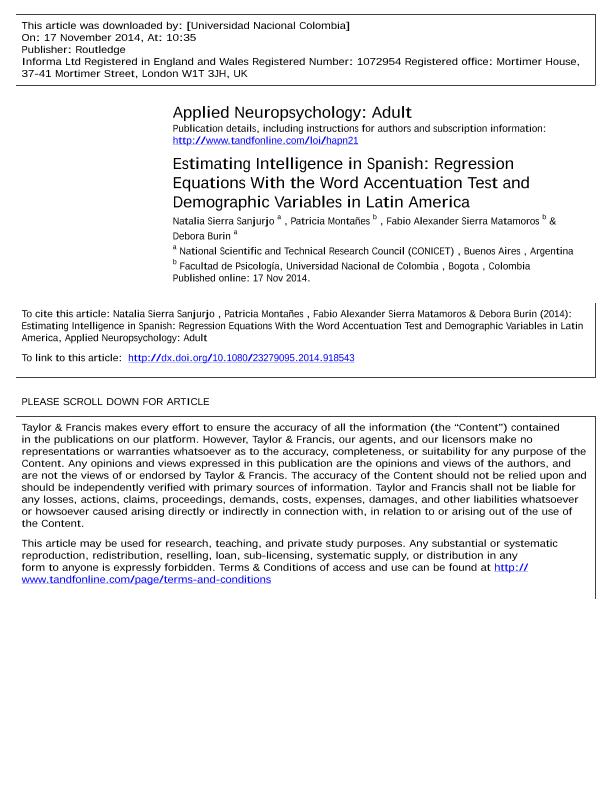Mostrar el registro sencillo del ítem
dc.contributor.author
Sierra Sanjurjo, Natalia

dc.contributor.author
Montañes, Patricia
dc.contributor.author
Sierra Matamoros, Fabio Alexander
dc.contributor.author
Burin, Debora Ines

dc.date.available
2018-08-17T21:37:54Z
dc.date.issued
2015-07
dc.identifier.citation
Sierra Sanjurjo, Natalia; Montañes, Patricia; Sierra Matamoros, Fabio Alexander; Burin, Debora Ines; Estimating Intelligence in Spanish: Regression Equations with the Word Accentuation Test and Demographic Variables in Latin America; Taylor & Francis; Applied Neuropsychology: Adult; 22; 4; 7-2015; 252-261
dc.identifier.issn
2327-9109
dc.identifier.uri
http://hdl.handle.net/11336/56290
dc.description.abstract
Spanish is the fourth most spoken language in the world, and the majority of Spanish speakers have a Latin American origin. Reading aloud infrequently accentuated words has been established as a National Adult Reading Test-like method to assess premorbid intelligence in Spanish. However, several versions have been proposed and validated with small and selected samples, in particular geographical conditions, and they seldom derive a formula for IQ estimation with the Wechsler Adult Intelligence Scale (WAIS) Full-Scale IQ (FSIQ). The objective of this study was to develop equations to estimate WAIS-Third Edition (WAIS-III) FSIQ from the Word Accentuation Test-Revised (WAT-R), demographic variables, and their combination within diverse Latin American samples. Two hundred and forty participants from Argentina and Colombia, selected according to age and years of education strata, were assessed with the WAT-R, the WAIS-III, and a structured questionnaire about demographic and medical information. A combined approach including place of birth, years of education, and WAT-R provided the best equation, explaining 76% of IQ variance. These equations could be useful for estimating premorbid IQ in patients with Latin American Spanish as their birth language.
dc.format
application/pdf
dc.language.iso
eng
dc.publisher
Taylor & Francis

dc.rights
info:eu-repo/semantics/openAccess
dc.rights.uri
https://creativecommons.org/licenses/by-nc-sa/2.5/ar/
dc.subject
Intelligence Estimation
dc.subject
Premorbid Intelligence
dc.subject
Spanish
dc.subject
Word Accentuation Test
dc.subject.classification
Psicología

dc.subject.classification
Psicología

dc.subject.classification
CIENCIAS SOCIALES

dc.title
Estimating Intelligence in Spanish: Regression Equations with the Word Accentuation Test and Demographic Variables in Latin America
dc.type
info:eu-repo/semantics/article
dc.type
info:ar-repo/semantics/artículo
dc.type
info:eu-repo/semantics/publishedVersion
dc.date.updated
2018-08-16T18:04:50Z
dc.journal.volume
22
dc.journal.number
4
dc.journal.pagination
252-261
dc.journal.pais
Reino Unido

dc.journal.ciudad
Londres
dc.description.fil
Fil: Sierra Sanjurjo, Natalia. Universidad Favaloro. Facultad de Medicina. Instituto de Neurociencias; Argentina. Consejo Nacional de Investigaciones Científicas y Técnicas; Argentina
dc.description.fil
Fil: Montañes, Patricia. Universidad Nacional de Colombia; Colombia
dc.description.fil
Fil: Sierra Matamoros, Fabio Alexander. Universidad Nacional de Colombia; Colombia
dc.description.fil
Fil: Burin, Debora Ines. Universidad de Buenos Aires. Facultad de Psicología. Instituto de Investigaciones; Argentina. Consejo Nacional de Investigaciones Científicas y Técnicas; Argentina
dc.journal.title
Applied Neuropsychology: Adult
dc.relation.alternativeid
info:eu-repo/semantics/altIdentifier/doi/http://dx.doi.org/10.1080/23279095.2014.918543
dc.relation.alternativeid
info:eu-repo/semantics/altIdentifier/url/https://www.tandfonline.com/doi/full/10.1080/23279095.2014.918543
Archivos asociados
